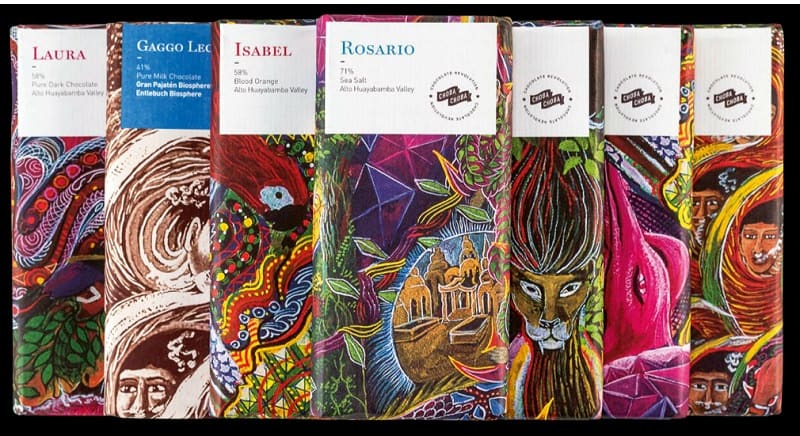Choba Choba
Admittedly, the whole thing is a bit colorful. But at least it makes an impression and comes directly from the chocolate shop.

When you learn about the origin of Choba Choba's products, namely the Peruvian valley Alto Huayabamba, the still young product makes sense figuratively. And in terms of content, it's an exciting start-up story anyway. And one that is right in the middle of the global chocolate business. According to the American Zion Market Research, the global chocolate market was estimated at USD 103 billion in 2017 and is expected to achieve sales of USD 160 billion by 2024. A gigantic industry, with enormous profits for the leading players such as Barry Callebaut, Cargill, Nestlé, Mars and Hershey.
Christoph Inauen and Éric Garnier both worked in the chocolate industry for many years and therefore also travelled to the source countries of cocoa, for example to Peru in 2008. Slowly, the two understood how the system really works. Namely, that there are an estimated six million farmers worldwide who are the key to the success of the large corporations, but who themselves are miserably compensated.
David against Goliath
The thoughts had to ripen like real fruit. It was not until February 2015 that the two young entrepreneurs were ready to take a big step and found a small start-up. At first, their Bern-based company was called "Our Own Cho-colate" and later renamed Choba Cho-ba AG. At the recent 8th Zermatt Summit, which focuses on sustainable entrepreneurship, Christoph Inauen was able to tell the company's story in front of around 200 experts from the fields of sustainability and corporate responsibility. "The majority of small farmers are struggling to survive and their descendants see no future in cocoa cultivation. We therefore wanted to build a platform where customers in the western world could buy their chocolate in the same way they could buy fresh vegetables directly from the farm. For this to work properly, we had to involve the cocoa farmers. Choba Choba was therefore set up with 36 Peruvian cocoa farmers and is now run in close partnership with these people."
"Choba Choba was set up with 36 Peruvian cacao farmers."
In addition to the colors, which also represent the cultural diversity of South America, a fitting name was needed, preferably in connection with the actual idea of the start-up. "If you help me, I'll help you" or "I'll help you if you help me" means Choba Choba.
Successful crowdfunding
The two initiators, the Swiss Inauen and the Frenchman Garnier, financed their start-up with a classic swarm financing. They raised the necessary start-up capital in just two weeks. They also used the Freie Ge-meinschaftsbank Genossenschaft, founded in Basel in 1984, as a platform. The purpose of the cooperative is to support charitable initiatives or initiatives that serve the general public by accepting and granting funds at the lowest possible interest rates. This applies, for example, to kindergartens, educational institutions, curative education, artistic initiatives, old people's homes or certified organic farming. Today, Choba Choba also works together with the Alternative Bank Switzerland, which, as it presents itself, is a socially and ecologically oriented bank that refrains from maximizing profits and places ethical principles in the foreground.
The brand that belongs to cocoa farmers
Their initially business contacts in Peru slowly developed into a friendship, a kind of family business. Inauen recalls: "Together with the cocoa farmers from the communities of Pucallpillo and Santa Rosa, we wanted to change the rules of the chocolate industry and founded the first Swiss chocolate brand that belongs to the cocoa farmers. These people are no longer just suppliers of raw materials, but are directly involved as partners in the decisions and thus in the success of the company".
The concept is simple in itself: the Péruan farmers set up their own "revolutionary fund", and five percent of all sales are continuously and automatically transferred into it. The farmers have a say in how this money is spent; they can have it paid out, finance other projects or even increase their share in the joint-stock company. The start-up's short-term goal is to have at least one third of the shares in Peruvian hands; in the long term, it should even be the majority.
provide welfare
Christopher Inauen studied development policy at the ETH Zurich and previously worked for various organisations in West Africa and Colombia. He also spoke in Zermatt about his experiences and his personal motivation: "We believe that one of the main tasks of any company should be to create welfare for the global community, to bring people together and to have a positive impact on our ecosystems. In our view, this is the true role of a company in today's society. Regardless of the environment in which it operates, where it operates and by whom it is managed."
And so Choba Choba talks about how their collaborative approach is unique in the global chocolate industry. They want to improve the living conditions of the cocoa farming families, and to do that they have to break new ground. The farmers are actively involved, have a say in the decision-making process and share in the profits of this business model.
Quality must be right
But you don't need to fool yourself. Even if the idea is great and the implementation remarkable: If the chocolate doesn't taste good, the project will implode pretty quickly. Especially in Switzerland, the country of chocolate consumers, a story must not only be positive, but also trigger excellent products. The company's promise therefore not only includes values such as sustainability and appreciation, but also choco-late commitments. "High-quality" promises, quote, "The best Swiss chocolatiers create fine, premium-quality choggi." And on the term "exclusivity", it conveys: "Our exquisite cocoa varieties come from the heart of the Peruvian Unesco biosphere." Anyone who wants to check out the quality can buy the Choba Choba chocolates online or in twenty partner shops throughout Switzerland.
In the case of this start-up, "success" is of course not expressed in purely monetary terms, at least not as far as the distribution to shareholders is concerned. More relevant are the five percent that automatically flow to Peru. And so the pure turnover is more decisive, and this is quite respectable: In the first business year of 2016, the company generated CHF 726,000, which means that CHF 36,300 - a lot of money in Peru - went directly to the farming families. In 2017, the turnover was almost CHF 1.5 million and last year CHF 2,010,000, so it's fair to call it a successful start-up.









